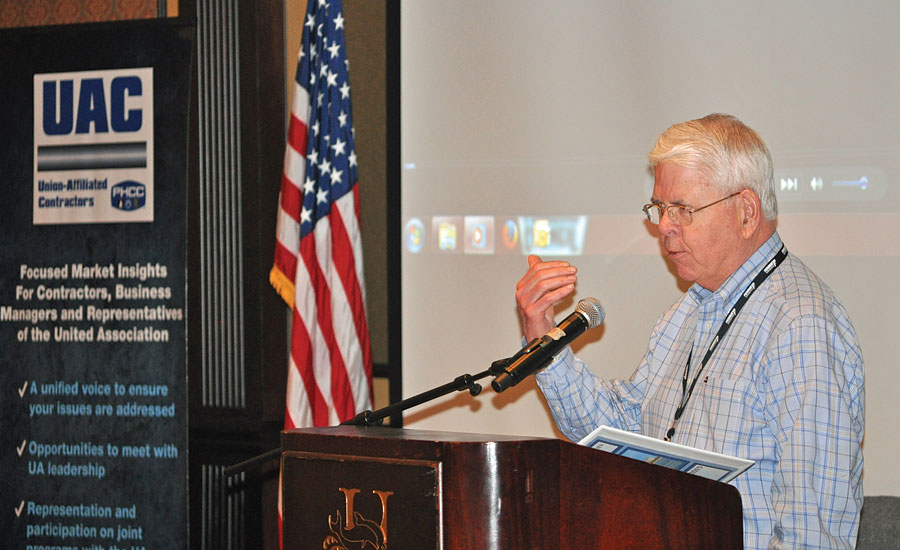PHCC's Gerry Kennedy: A life-long educator
While Gerry Kennedy’s formal relationship with the Plumbing-Heating-Cooling Contractors — National Association concludes Dec. 31, he will continue to be a part of the organization.

Gerry Kennedy, PHCC executive vice president emeritus, speaks to PHCC’s Union-Affiliated Contractors best practices group.
While Gerry Kennedy’s formal relationship with the Plumbing-Heating-Cooling Contractors — National Association concludes Dec. 31, he will continue to be a part of the organization. “PHCC has the best contractors, the best volunteer leaders, the best auxiliary and spouses, the best industry partners and sponsors, the best state and local executives, and the best national staff,” he says. “There is much more to be done to continue the proud legacy at PHCC.”
His successor, Executive Vice President Michael Copp, has asked him to dig through PHCC’s archives and expand upon “A Heritage Unique,” which chronicles the founding of PHCC in 1883 through 1987, to include the organization’s history from 1988 through 2015.
Kennedy’s career at PHCC, which spans nearly two decades, started in 1997 when he became the group’s vice president of education and chief operating officer of the PHCC Educational Foundation, the association’s education and training arm. But his career in education began as a 13-year-old Boy Scout patrol leader, when Kennedy realized he had an aptitude for helping others, which led him to become a high school teacher.
His studies at what is now New Jersey’s Montclair State University and the University of Connecticut allowed Kennedy to combine administrative work with counseling students, which he loved. At UConn, he designed a course of study that emphasized adult and continuing education. After a successful career as a college and university professor, administrator and dean, he became an association executive in 1982.
Familiarity with the trades began with his work at the Association for Career and Technical Education, which represents administrators, counselors and teachers in “trade” programs. “I already knew these professionals were desperate to convince trade professionals to participate in advisory committees to help improve instructional programs,” he notes. “So when the PHCC job came to my attention, I knew this would be an opportunity to bring trade professionals and educators together to strengthen instructional programs for students who do not want a college degree but who do want a well-paying job.”
Through his 12 years heading the PHCC Educational Foundation, Kennedy grew its endowment by bringing in new endowment donors and industry sponsorships, including one manufacturer and 18 major contractor donors. The pledges from these donors added more than $1.5 million to the foundation’s endowment. Kennedy also oversaw the restructuring of the Invest in Your Future Annual Giving Campaign, and implemented new donor recognition levels to thank donors who are taking smaller steps on their way to becoming major donors.
He encouraged contractors to serve on foundation committees, and successfully integrated the apprentice and journeyman programs that were transferred from PHCC in 2005. A string of successful educational programs were created or updated under Kennedy’s direction, including the Understanding Overhead software, online Contractor Resource Center, the Essentials of Project Management course, the Kohler Seminar Series and the scholarship program.
A major accomplishment was the revision of a four-year series of plumbing and HVACR textbooks, along with their accompanying instructor materials and online study versions.
In early 2010, then PHCC President Skip Pfeffer asked Kennedy to take on the acting EVP role after the resignation of Dwight “Ike” Casey. Kennedy was named EVP later that spring. “I knew I could hit the ground running and help PHCC to succeed,” he recalls. “I knew it would require that I postpone my retirement for three years, but I knew the challenge would be exciting. And it has been!”
Kennedy cites three accomplishments as PHCC’s EVP:
-
The development of a long-term strategic plan to help move the organization forward. Contractor members set the direction so the staff knows what the priorities are, such as training initiatives and legislative issues.
-
Hiring Chuck White as the association’s full-time technical director. White is a third-generation contractor in a fourth-generation business who understands the plumbing and HVAC business and codes.
-
The nearly four-year focus on fighting regulatory initiatives that would make it difficult or impossible for PHC contractors to deliver the services and install the products consumers want and need.
One major change he has seen in his 18 years in the industry is the increasing use of technology in a contractor’s business, such as building information modeling, backoffice computer software and systems, and mobile technology for field technicians. Another is the use of electronic communication — such as social media and webinars — to deliver information and educational programs to contractors. These programs and systems will continue to help contractors be more productive and profitable.
“A third has been the increasing emphasis on the need to protect the environment while not creating regulations and laws that don’t balance the environment with practical ROI considerations,” Kennedy says.
Whatever the future holds for contracting businesses, the need will always exist for comprehensive education and training. And the call to arms for a skilled workforce in the plumbing and HVAC trades will continue.
“Apprentice programs are a great way for entry-level workers to learn while earning,” Kennedy says. “However, the new products being developed and the way those products need to be installed will require plumbing and HVACR instructors to stay current. It’s not enough to teach what you learned 20 years ago. By the same token, technicians must continuously improve their skills, so continuing education is important.
“Many community and technical colleges have plumbing and HVACR programs. It is important that contractors support apprentice and community/technical college programs by serving on advisory committees and offering internships to help entry-level workers develop into the skilled workforce needed by our industry.”
Looking for a reprint of this article?
From high-res PDFs to custom plaques, order your copy today!






